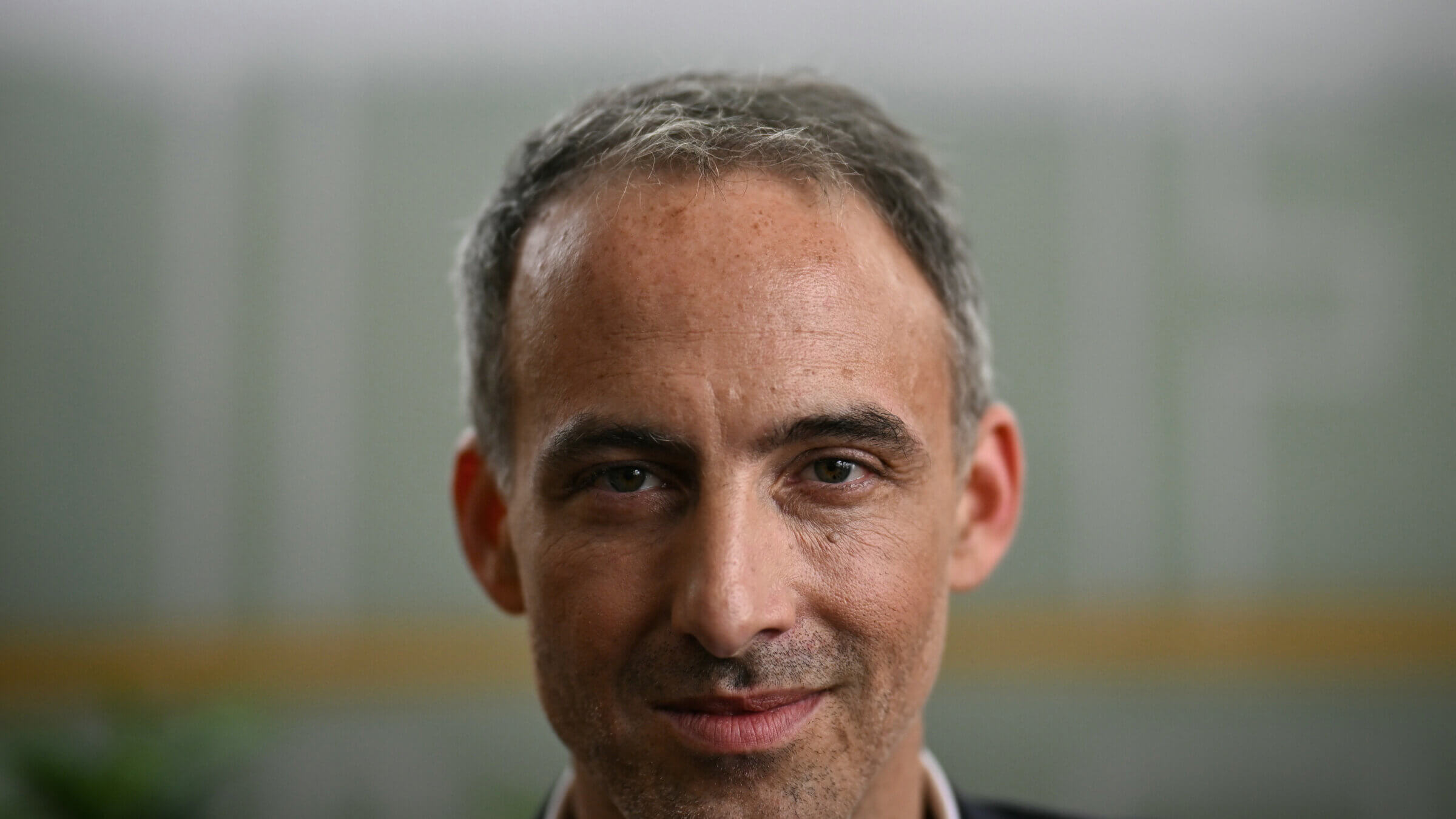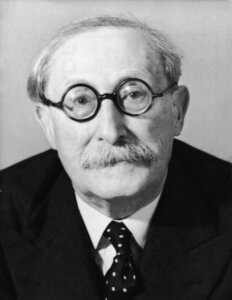Behind a dramatic election in France, the rise of a new Jewish leader — and also antisemitism
A surprisingly strong Socialist performance was led by Raphaël Glucksmann, whose grandparents emigrated to France in the 1930s

Raphaël Glucksmann, leader of the French Socialist Party. Photo by Getty Images
In the wake of yesterday’s election for candidates to the European Parliament, everything and nothing has changed in France.
Nothing changed insofar as pollsters had long predicted an electoral slam dunk by Marine Le Pen’s far-right Rassemblement national (RN), or National Rally. Led by its president, the 20-something Jordan Bardella, the party won slightly over 31% of the vote. France now has the dubious reputation of sending the largest contingent of ethno-nationalist and illiberal parties to Strasbourg, the eastern French city that is home for the parliament.
But if you look at the also-rans, everything has changed in French politics. As significant as the electoral wave that lifted the RN to first place was the surprising surge that nearly catapulted the Socialist Party into second place. With 14% of the vote, the Socialists finished just behind President Emmanuel Macron’s centrist Renaissance Party, whose flat performance reflects less a rebirth than a still birth.
This was an event, announced Le Monde, that Renaissance “didn’t see coming.” For months, Macron and his staff insisted that the real threat came from the far-left La France insoumise, or Defiant France, led by the suitably defiant and divisive Jean-Luc Mélenchon, which constitutes the largest leftwing party in the country’s National Assembly. As for the Socialist Party, Macron’s team could not be bothered, claiming that it simply “did not exist.” Period.
In a way, it was true that the Socialists did not exist. When Macron won the presidential election in 2017, his political party, then called En Marche!, marched over the seemingly lifeless body of the Socialist Party. A desultory five years under the floundering presidency of the Socialist François Hollande left the party in disarray. In 2017, their presidential candidate, Benoît Hamon, won only 6% of the popular vote; in 2019, they were virtually erased from Parliament in the previous European election. On life support, the Socialists subsequently joined an unwieldy leftwing coalition thrown together by Mélenchon that, largely due to his party’s scarcely veiled anti-Zionism after Oct. 7, has since collapsed.
Though the decline and fall of the Socialist Party has been gradual, it has also been seismic. Ever since its founding in the late 19th century, the party has played a key role in pushing France to live up to its revolutionary ideals of liberty, equality, and fraternity. It was the party that was the first to rally, at the urging of Jean Jaurès, to the defense of Alfred Dreyfus in the 1890s; the party to enact a series of labor and social reforms that transformed the lives of French workers in the 1930s; the party whose members were among the first to join the resistance against the Nazi occupation a decade later; and the party that abolished the death penalty, decriminalized homosexuality, and created a ministry of women’s rights in the 1980s.

Notably, the Socialists also happen to be the first party led by a Jew, Léon Blum, who was also the first Jew to lead France when, in 1936, he became prime minister in the Popular Front government. This provides a curious context to what has just happened in France. The leader of the Socialist list is Raphaël Glucksmann. His grandparents were leftwing Zionists from Eastern Europe who emigrated to France in the mid-1930s; joining the Resistance, his grandmother survived the war, but his grandfather died in 1940 when the ship that was transporting him was torpedoed and sunk.
In the 1970s, their youngest child, André Glucksmann, after a long flirtation with Maoism, became a leading member of the so-called nouveaux philosophes. Telegenic and iconoclastic, Glucksmann and his comrade Bernard-Henri Lévy lambasted the previous generation of French intellectuals who, beholden to the Marxist vulgate, were blind to the crimes of Soviet communism. (This critique was not so nouveau. Raymond Aron had made a more devastating case in his 1955 classic The Opium of the Intellectuals, but perhaps because he had lacked the good looks and glib phrasing of Glucksmann and Lévy, he was largely overlooked.)
By the time he died in 2015, Glucksmann had pivoted from his revolutionary militancy on the left to a hawkish neoliberalism on the right. He was a guest of honor at the last public event for conservative Nicolas Sarkozy’s successful 2007 presidential campaign and brought along his son Raphaël. This was inevitably controversial, even though the Glucksmanns subsequently penned a book arguing that Sarkozy, who scored political points by excoriating the student rebellion of 1968, did not understand that it was fundamentally liberal as well as liberating.
Nevertheless, the political path since taken by Glucksmann fils has been a mirror image of Glucksmann père, moving from the neo-conservatism embraced by his father to what we might call a neo-socialism that embraces a realist understanding of the limits of state power. He began as a literary essayist and documentary filmmaker; his film Tuez-les tous! (Kill Them All!), a searing account of the 1994 Hutu massacre of Tutsis in Rwanda, rightly lays partial responsibility at the door of Mitterrand’s government. Subsequently, Glucksmann served as an advisor first to Mikheil Saakashvili, the reformist president of Georgia whose career eventually became mired in charges of corruption and human rights abuses, then as an adviser to the leaders of the pro-European protests in Ukraine, which led to the ouster of the country’s pro-Russian regime.
From his role behind the stage of European politics, Glucksmann stepped directly onto the stage of French politics in 2018, when he co-founded Place Publique, a party committed to green revolution and European integration. Five years later, as the leader of Place Publique, Glucksmann allied with the diminished Socialist Party to present a common list for Sunday’s election. As telegenic as his father, Glucksmann’s presence on the campaign trail has resurrected the seemingly defunct Socialists and remade them, instead of Defiant France, the leading party of the left.
The revival of the French Socialists, however, has been accompanied by the revival of French antisemitism. In the wake of the Dreyfus Affair, antisemitism continued to play a powerful role in French culture and politics. By the 1930s and the rise of the Popular Front, it became explosive. For example, when Blum became prime minister, the deputy Xavier Vallat welcomed him with a warning: “Your arrival is without doubt a historic date. For the first time this ancient Gallo-Roman land is to be ruled by a Jew…It would be better to have someone whose origins, however modest, lie deep in our soil rather than a subtle Talmudist.” (Not surprisingly, Vallat went on to become Vichy’s first Commissioner for Jewish Affairs in 1940.)
For the moment, the expression of antisemitism today has been neither as virulent nor explicit as it was in the 1930s. What is disconcerting, though, is that it issues not from the far-right but instead from the far-left. Not only have antisemitic incidents in France risen sharply since the Hamas massacre last October, but justifications for the massacre and condemnations of Israel — not simply the current Israeli government — have also multiplied. The leadership of Defiant France, in part to attract votes from immigrant neighborhoods, not only refused to identify Hamas as a terrorist organization or clearly condemn the massacre, but allowed certain members to declare, long after details of the massacre became known, insisted it was an “act of resistance.”
It seems this peculiar resistance is also alive and well in France. Last week, dozens of Place Publique-Socialist posters in several cities were defaced with swastikas and SS emblems, as well as a Hitlerian mustache inked on Glucksmann’s image. (As Glucksmann declared, the reason his posters alone were defaced “is as depressing as it is obvious: my name. Glucksmann. A Jewish name.”)
The irony is that Glucksmann has explicitly and repeatedly called for a cease-fire, demanded the recognition of a Palestinian state, and condemned the disproportionate response of the Israeli military. The problem for those to his left, it seems, is that he has also called for a hostage exchange and condemnation of Hamas. “Nothing justifies the horror of massacred civilians,” Glucksmann declared last week, “just as nothing justifies the torrent of hatred, dehumanization and glorification of the murder of Israeli and Palestinian civilians since the pogrom of Oct. 7. The sickening calls for Israel’s destruction — whether from Hamas, Iran, and certain activists in France — and the abject dehumanization of Palestinians by Israeli leaders can only intensify the agony of both peoples.”
But along with the irony, there is tragedy. Upon learning of the poster incidents, Glucksmann denounced Mélenchon’s baseless claim that antisemitism in France had become “residual.” With a sigh, he observed that “this hatred has not disappeared.” No single election will ever change that. Yet tragedy does not entail passivity.
“We achieved a success that no one expected,” Glucksmann declared once the election results were in, but it is a success that condemns us to tireless struggle.”

















